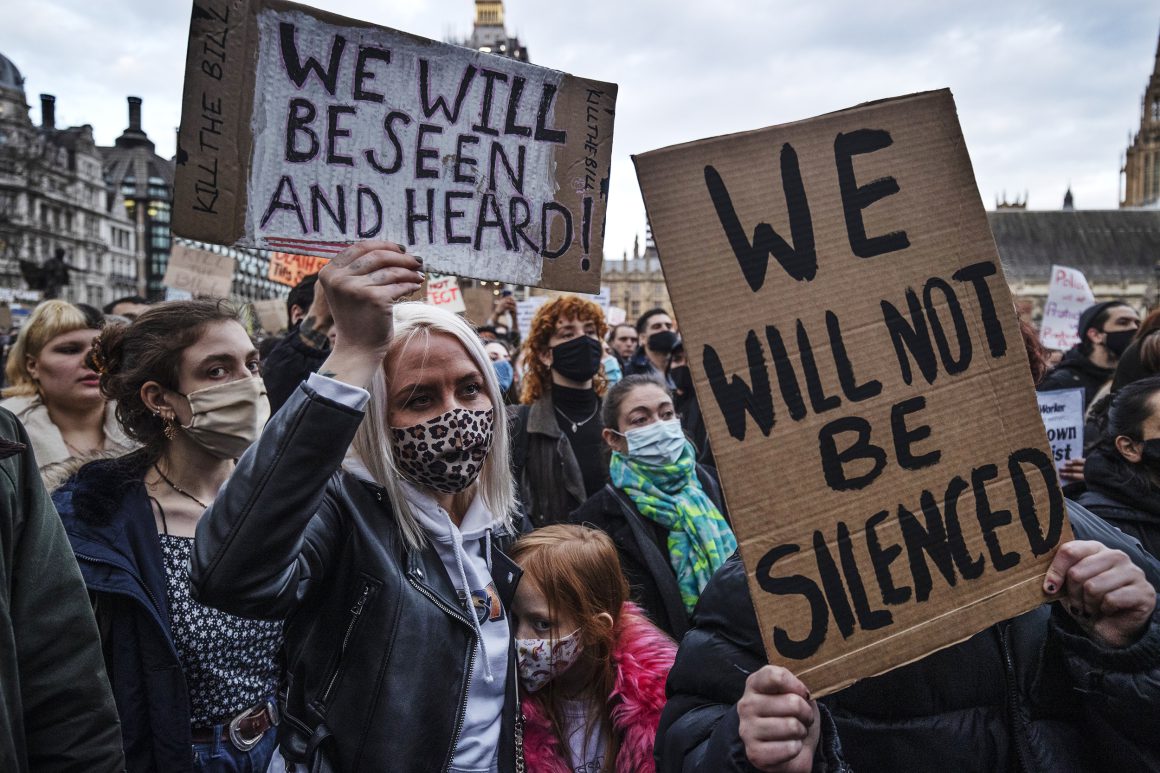ISA’s International Women’s Bureau and ROSA International
2021 has been another year of struggle against sexism, LGBTQphobia and racism, including mass protests and strikes, inspiring examples of solidarity being built amongst workers of all genders.
At the Mercedes plant in the Basque Country, there was a strike of 3500 workers after the murder of fellow worker Erika Tavares, demanding an end to gendered violence.
In response to anti-abortion bills taken up by the United States Supreme Court and the shocking Texas abortion ban, tens of thousands of women demonstrated on 2 October calling for #BansOffOurBodies to protect the right to abortion nationally. Over 100,000 workers in the US are negotiating labor contracts and taking action from the film industry to factories in what’s being called “Striketober”.
Struggles have won abortion rights in Argentina and Mexico. More than 5000 indigenous women marched through Brasilia against attempts by Brazilian president Bolsonaro to hand over native land to mining companies. This is the context in which we mark the 25th November — organising for it to be a day of struggle, rather than empty words by the establishment.
“From the early months of the pandemic, UN Secretary-General António Guterres called for a global ceasefire to end the shadow pandemic of violence against women and girls, appealing for peace in the home and an end to all violence everywhere.” — from the UN statement for the International Day for the Elimination of Violence Against Women.
When you consider the levels of violence against women globally, a ceasefire is definitely needed. The UN’s own figures estimate that 1 in 4 women experience physical or sexual violence during pregnancy, 603 million women live in countries where domestic violence is not considered a crime and 80% of those trafficked are women and girls, 79% for sexual exploitation. Black women and women from an immigrant background are faced with even higher levels of violence. The US Institute for Women’s Policy Research found in 2017 that more than four in ten Black women experience physical violence from an intimate partner during their lifetimes and cited studies that show that Black women were two and a half times more likely to be murdered by men than their white counterparts.
However, it will take more than wishful thinking and an appeal for peace to end violence — particularly when it comes from an international capitalist institution which defends a system which is responsible for misogynistic violence to begin with.
Going beyond the empty words of institutions like the UN or any “progressive” government, women have taken action themselves, understanding it’s them organising the fight that achieves victories and concessions. That’s how abortion rights were obtained in Argentina and Mexico this year, a fundamental fight against gender-based violence from the state.
Capitalism is increasingly being challenged across the world. From the re-emergence of the youth strikes for the climate, to the strikes of workers refusing to pay for the new economic crisis, to revolutionary uprisings in Colombia and Myanmar in recent months, and the struggle of indigenous people against the destruction of the Amazon rainforest. Women are on the front lines in all of these, not least because capitalism is proving more and more to not be able to provide a safe life for us.
Afghanistan — imperialist failures lead to major setback for women and LGBTQ+ people
The disastrous end of the imperialist intervention into Afghanistan has led to the return of the Taliban and a regime based on systematic gender-based violence. Many people have already fled the country, seeking asylum in desperation in other countries. Whereas in solidarity protests in several countries the support among broader layers for women and LGBTQ+ people fleeing this reactionary regime was clear, most of these refugees will at best find refuge in camps that are anything but safe for them, with most countries keeping their borders closed to them. The governments of these countries are not concerned with their plight, as they were not concerned with them whilst they propped up the corrupt Ghani government. The war in Afghanistan itself caused tens of thousands of deaths — 43% women and children — and violence against women did not disappear when the Taliban was driven out in 2001.
The promises of the Taliban to allow women some freedoms cannot be believed. Whilst the fact that the Taliban have to make these verbal pledges shows the impact of the global feminist movement in recent years, it has to be recognised for the setback that it is. Sharia Law has been enacted meaning that women cannot leave the house without a man and dress codes have been enforced. For the Taliban, women are the property of men. It is an extreme example of the position of women in class society — for thousands of years being considered as property in the eyes of the establishment, law and religion. LGBTQ people are also facing unprecedented physical threats to their very existence, now pushed into a life made of constant fear and hiding.
No matter how dark things can seem, there is always the light of resistance. Demonstrations have already taken place against attempts to push women back into the home and out of education. The struggle against violence against women must be international and build solidarity with those fighting back in Afghanistan and in all countries against archaic regimes and laws which enshrine women as second-class citizens.
Abortion rights a battleground
Abortion rights are also a battleground across the world. This fundamental right to decide over one’s own body is still being denied to millions of women and other people who can become pregnant, through repressive laws or the total absence of basic health care that is accessible for all. While in some countries determined struggle led to steps ahead in obtaining this right, in other countries attacks on existing abortion rights are in full swing. In recent years there have been protests and strikes in Poland against the reactionary Law & Justice government implementing more restrictions to abortion rights, and there have also been victories won in Argentina and Mexico. After years of the mass feminist movement, in Argentina the government legalised abortion. In Mexico this year, the Supreme Court of Justice of the Nation declared criminalisation of abortion ‘unconstitutional’ in Coahuila, joining similar rulings in Oaxaca, Hidalgo, Veracruz and Mexico City. This is not the end of the struggle — there still needs to be a fight for the right to abortion and the healthcare system to provide it. But it is an indication of what the feminist movement can achieve through struggle. The struggle to obtain such rights — and to protect them against new attacks that can always come when the capitalist system stays in power — is so much stronger if the feminist movement links up with other movements against oppression and with working class organisations.
In the US, despite President Biden’s promise to make Roe v Wade ‘the law of the land’, abortion has been effectively outlawed in Texas and is under threat in other states. The new law in Texas, Senate Bill 8, prohibits all abortions after a foetal heartbeat can be detected, with no exceptions for rape, when up to 95% of abortions take place after this time. More than this, the enforcement of this ban entirely relies on individuals to file lawsuits against anyone for ‘aiding and abetting’ abortion in any way. Such lawsuits, with the threat of economic devastation, are meant to scare safe abortions out of existence and if successful, will be a model for the right-wing offensive against abortion access in the US.
It highlights an important point for the women’s and workers’ movement everywhere — we can’t rely on the courts for our rights, nor on the so-called progressive establishment parties, who are clearly not prepared to put up a real fight on this issue. Roe v Wade was won in 1973 under pressure from the women’s movement in the US in the 1960s, a powerful mass movement that co-existed with other struggles in the context of the revolutionary wave that pushed politics to the left, but decades of attacks by the right wing have severely restricted abortion access across a large swath of the country, with Democratic politicians offering up token resistance. Now right-wing politicians attack the right itself, showing how we need to always remain vigilant as any rights won under capitalism can be rolled back.
Under capitalism, reproductive rights will always be a struggle because of the centrality of state control of bodies to women’s oppression. Historically, the need to know the parentage of children and therefore control the sexuality of women was one of the cornerstones in the development of sexism and the subjugation of women. Overwhelmingly, experience shows that banning abortion does not reduce abortion rates but makes safe abortion much more difficult to access, for the poor and working class most of all, with deadly consequences. It also impacts more on working class and poor women who in the majority of countries don’t have a real choice about when and whether to have children because of the high cost of childcare, the high cost of living while wages are kept low and also concern over what the future holds, including the impact of climate change. Women can also be subject to pressure to have children when they simply don’t want to, because of the idea that their main role is to reproduce. State sanctioned control of women’s bodies amounts to violence when we look at the fact that 7 million women are hospitalised each year from unsafe abortions and the countless more who are policed by the state and denied the most basic of rights — control over your own body.
Also, women’s reproductive rights can be turned off and on again depending on the needs of capitalism. In the US, abortion is a political football, used by the right-wing to shore up their support in the reactionary Christian voter base. In China, after decades of a one child policy because the system couldn’t deal with the growing population, leading to illegal gender-selective abortions because having a son was favoured, now the regime has removed this policy and is campaigning for women to have more children because of fears of a shrinking workforce, something which has declined for the last 8 years. This is backed up by making divorce harder, a repressive censorship campaign against feminist groups and propaganda about the role of ‘traditional’ families and gender roles. This anti-feminism is linked to the overall nationalist hysteria of the Chinese regime as they try to shore up support for the dictatorship. A political football is also what women’s rights are reduced to in the context of the escalating battle for world hegemony between the two dominant imperialist superpowers, US and China. Chinese state media have run stories trying to discredit the nascent #MeToo movement by blaming it on some US-inspired conspiracy to use gender issues in order to stir up chaos in China. In parallel, Biden’s administration is parading its feminist credentials as a weapon in this new “Cold War”, despite the Democratic Party establishment having a long record of offering scant resistance to reactionary assaults on women in its own backyard.
State violence against women
In the last year we campaigned in solidarity against the systematic sexual violence of the Tatmadaw in order to suppress the revolt against the military coup in Myanmar. Every reactionary regime uses systematic gender-based violence as a weapon to suppress the majority of the population, but reality shows that state violence against women is a feature also in the advanced capitalist world. This has been acutely shown in Britain with the murders of Sarah Everard and Sabina Nessa. Sarah was murdered by a serving police officer, who used his police ID to arrest her while she was walking home on the pretext of her breaking covid lockdown restrictions. Sabina was murdered at the same time as the vile details of Sarah’s murder were being heard in court. The fact in the 6 months between the murders of these two women another 80 women were killed by men in the UK has angered vast swathes of the population. But what angered people more was the response by the police who initially resorted to victim blaming, saying women shouldn’t go out at night by themselves, despite the majority of these women being killed in their own homes by someone known to them. Not only did the police violently attack a peaceful vigil for Sarah Everard, the victim blaming continued when they advised people who didn’t trust a police officer who stopped them to ‘flag down a bus’ or even call 999 to check they were genuine. Not only would this not have saved Sarah — her murderer was a ‘genuine’ police officer — it is a complete indictment of the police force and institutionalised misogynistic violence within it. Recent figures show that 666 police officers in the UK had accusations of gendered violence against them in a three year period, but only 3.9% were convicted. Sarah Everard was the 16th woman to be killed by a police officer since 2009.
The police force in a capitalist society are not there to defend ordinary people, they are there primarily for the protection of private property and the state. There are many examples of the police being used to violently attack protests and workers’ picket lines, as well as infiltrate left-wing political groups, forming relationships with their female members as a way of spying on them. Any investigations into police conduct must be carried out by genuine independent inquiries, including representatives from the victims’ families, trade unions, women’s rights and anti-racist organisations and so on. We also need democratic control over where police are deployed, how they carry out investigations, and over the hiring and firing of police officers to be able to drive out sexist, racist, homophobic and transphobic police officers.
Sexist ideas are clearly very dominant within the police force itself. The murderer of Sarah Everard was also part of a WhatsApp group with other police officers who sent each other misogynistic, homophobic and racist messages. He was reported to have carried out a number of indecent exposures, as far back as 2015, but the police never seriously investigated it. These acts of sending sexist messages, making female colleagues feel uncomfortable and other behaviour are often considered to be ‘low-level’ and as such not taken seriously. However, going unchallenged in workplaces, communities and education establishments everywhere, together they make up a society which perpetuates and reinforces problematic attitudes towards women, particularly of women’s sexuality and ideas of male entitlement to women’s bodies. In an extreme way this can lead to the murder of seemingly random women on the streets, as was the case with Sarah Everard and Sabina Nessa. The murderer of Nicole Smallman and Bibaa Henry who were killed in June 2020 in London, Danyal Hussein, was part of a government ‘deradicalisation’ programme, believing that he needed to ‘sacrifice women’ to be successful, including that he could cast spells to make himself more attractive to women. Jake Davidson, who shot and killed 5 people in Plymouth in August, was part of the misogynistic ‘incel’ movement, which blames women for their perceived failings.
These brutal examples from Britain are unfortunately replicated the world over. The prevalence of violence against women is rooted in the conditions of a deeply unequal society, originating at the top, in the institutions of the state, but permeating throughout society.
Marxist understanding on where violence comes from
Vladimir Lenin, one of the leaders of the Russian Revolution, described the state as being made up of “special bodies of armed men”, building on the analysis of the state by Frederich Engels, close collaborator of Karl Marx. Marxist ideas are based on this understanding, that because capitalism is a society in which a tiny minority of people — the capitalist class — hold power over the vast majority — the working class — this is only possible on the basis of enforcement and repression. The growing social upheavals and instability world capitalism is confronted with has meant that the brute force of the state, as a tool for the ruling class to maintain relations of exploitation and oppression in place, has been brought more to the fore. This has yet again been emphatically illustrated by the recent military coup in Sudan, against which mass resistance, involving a large wave of strikes, has developed. Women have been in the front rows of this heroic resistance. In India, women and minorities -especially those from Dalit, low castes and Adivasi background — have been the most affected by a pattern of state-sponsored violence that has grown dramatically under the current right-wing, Hindu nationalist government of Narendra Modi and the BJP. But events have also propelled Indian working, poor and oppressed women in the forefront of very important struggles, most notably in the ongoing, one year-long farmer protests, a historic rebellion against the BJP’s neoliberal agenda and its pro-corporate farm laws.
Worldwide, women, along with the most oppressed and marginalised communities, have been at the receiving end of the trend towards more authoritarian forms of capitalist rule. In an extreme form, in places like Myanmar, Ethiopia or occupied Kashmir, widespread rape and sexual violence have been used as a weapon to subjugate women and crush resistance to occupation and military rule. That doesn’t mean the state always takes the form of a police state or military dictatorship. The capitalist state — the ‘superstructure’ as Engels described it — is also made up of the education system, religious institutions, the media and so on, all of which reinforce the capitalist ideology. Mainly this is to reinforce the idea that the working class is powerless to change society and that competing against each other for the crumbs off the rich people’s tables is all we can hope for.
This also involves promoting divisions amongst the working class, such as on the basis of gender, race, religion, sexuality and so on. To fuel its profit-making machine, the capitalist class requires the supplying and regeneration of a continuous stream of disciplined and obedient workers, at the lowest cost possible for the system itself. In that sense, the patriarchal family unit plays a central role for capitalism, both economically and ideologically. Gender roles and the family serve to ‘keep people in line’ as useful tools for social control. Promoting the idea of women’s role in the family as child rearer and caregiver is useful also for saving huge sums of money for the state. As well as the $10trillion worth (according to estimations by Oxfam) in unpaid work that women do globally in the home, these ideas exist in the labour market too as justification for lower pay for ‘traditional women’s work’, such as in the care sector. It’s not just in the family, but within society as a whole, that gender roles are reinforced. For example, the commodification of women and LGBTQ+ people’s bodies is used in advertising to sell products but also reinforces ideas of male entitlement over women’s bodies, portraying women as sex objects for men rather than rounded people.
This all means that not only is there state violence against women and the working class generally, the use of violence exists at all levels within society. Sexism, although originating in class divided societies and rooted in the state, also exists within the working class. The root cause of violence against women lies especially in the patriarchal family structure, an economic and social base in class society since its inception. The majority of violence experienced comes from an individual, usually a male intimate partner or family member. This violence is, at its core, about the control of women’s sexuality and bodies. The domestic basis for this particular gender violence is noticeable in its character as very intimate, usually arising gradually, mixed with psychological manipulation, which is often very destructive for the victim.
Capitalism distorts human relations — far from being able to form them freely, people can be forced to stay in unhappy or even violent relationships for financial reasons or being worried about the stigma of divorce, being single parents etc. The collapse or non-existence of the welfare state can contribute to this and can mean family members are reliant on each other for care, rather than the state. The pressures of everyday life can be triggers for violence as people struggle with money, mental health issues and problems at work, illustrated by the increase in domestic abuse during covid lockdowns in the past two years.
The worldwide economic crisis unleashed last year by the pandemic has had devastating effects on millions of women, driving a disproportionate increase in job losses and poverty among women, and widening the gender poverty gap. Women were hit harder by loss of jobs and income, and that is even more the case for black women, women of colour, women from immigrant backgrounds, who are also now profiting less from the relative recovery. Total employment for Black women in the US is 9.7% lower than it was in February 2020, before Covid-19 hit the U.S., with that figure for Hispanic women close behind at 8.6% lower. Employment for white men, white women, and Black men is down 5%, 5.4% and 5.9%, respectively, since February 2020. According to a recent study, women who lost their jobs during the pandemic in India are now 11 times more likely than men not to return to work. Despite all the talk of a “recovery”, the crisis has left a lingering impact on the situation faced by women globally, putting them at a greater risk of gender-based violence, of being unable to escape abusive partners, or of being threatened by the scourges of sexual exploitation and trafficking.
Sexist ideas and behaviour don’t drop from the sky, or originate solely in the mind of an individual, but reflect the type of society that we live in. Capitalism is based on unequal power relations and divisions within the working class exist as a result, including sexism which can at times give the illusion of power to perpetrators of gendered violence. This means that whilst we should challenge every individual instance of sexist behaviour, it will not be enough to fundamentally change the position of women within society. it will require a root and branch change of society to remove sexism and gendered violence completely. An important feature of protests and movements in recent years has been to point the blame for violence at the system. Individual cases of gendered violence may spark a protest movement, but demands quickly develop beyond justice for the individual victim to demanding justice for all. Beginning with the Slutwalks in 2011, then the opening of the floodgates through #MeToo, movements from Columbia and Chile to Myanmar and Australia have put at the forefront the idea that ‘the whole system is guilty’ in the face of victim blaming and state violence.
Rosa and ISA promote, support and actively invest in these movements, helping them to build wherever we can, but argue that we need to go further. Not just declaring what is wrong, but putting forward an alternative to this sick system. Socialist feminism offers a vision of the transformed society we need. But it can also help us in building the type of movement that’s necessary to achieve this in a concrete way. We raise the need for a united, working-class struggle because it is the diverse working class which has the power to change society. Workers’ position — as wealth creators — means that when they go on strike, it has the power to bring the whole of the country (or the world) to a standstill. More than that, the working class are the people who are actually needed to make society run and have a vital role to play in the building of a new, socialist society. The working class coming to power is the key idea behind socialism. In order to be able to achieve this, we need a united movement. Through collective struggle, attitudes change when it is revealed that we have more in common with each other than we do with people of the same gender, race, sexuality or nationality in the ruling class. United struggle also reveals how much stronger we are when we come together than when we fight alone.
The last decade has shown that to limit our aims to getting more women into politics or business is a complete blind-alley. Our movement does need to pay special attention to the triple and quadruple oppressions experienced, for example, by working class women who are also Black and/or gay and/or trans. We need to fight for a movement that is representative of everyone, takes up the rights of every oppressed group and where everyone can participate. But we need to look at what unites us rather than what makes us different — our position as part of the working class. This type of movement can only be built democratically with the mass involvement of all of those who are oppressed participating in not just action, but also in discussions about what the movement is fighting for. It is on this basis we can see how we can win not just our immediate demands but a new type of society free from oppression, inequality and violence: a socialist society.
A socialist society is one where the working class is democratically in control of what happens. Through nationalising big business and the banks we would be able to use the wealth which exists in society to benefit the majority. We could massively increase wages and decrease working hours so that everyone has a decent standard of living. Economic liberation for women would mean that there wouldn’t need to be a choice between having children and being able to work and there would be the freedom to leave a relationship if it was unhappy or violent. Fully funding public services would mean access to the healthcare that women need, including free abortion and contraception at the point of need, as well as other services to ensure that we are safe and that take over a good part of the unpaid reproductive work mostly women do in the home in the form of free public services. This is just one side of it. By changing the economic system we could also fundamentally change attitudes towards women, which have their roots in class society.
Rosa and ISA are building a socialist feminist movement against gendered violence. This means a united movement which links the demands to end violence against women with the broader working class fightback taking place. In the face of the pandemic-triggered crisis, governments are forcing workers and the poor to pay the price — with their jobs, livelihoods and even their lives. We are actively building strikes, protests and other workers action to win pay rises, save jobs, save services and to end violence and victim blaming. Join us in this struggle!
- We SayNi Una Menos —Not One Less — no more lives must be lost due to gender violence; no more mental health or physical health damaged. We fight to end gender violence, abuse and harassment in all its forms and everywhere it takes place: the workplace, the home, schools and universities, state institutions, on the street and online.
- Politicians are saving banks and companies but women’s lives are sacrificed. This pandemic of violence requires emergency measures. We need an immediate increase in public spending and the development of government policies to fight violence against women. This should include the construction of shelters and networks for women andchildren in situations of violence and specialised domestic violence and sexual violence services available locally to everyone who needs them. Mental health services should include local access to the counselling and therapy required by victims, as well as specialised psychological assessments and treatment for perpetrators. There should be a living wage and a guaranteed job for everyone to make an independent life possible.
- Coronavirus has highlighted the fundamental need to put welfare of everyone as the first priority. We need to seize the wealth of the capitalist elite to fund a massive expansion of public services; from free healthcare (including vaccines for all, liberating the patent and the technical knowledge, bringing the pharmaceutical industry into public hands, to produce vaccines and testing facilities in every corner of the world) to free childcare. There is no reason at all for mass unemployment when there is so much that needs to be done. With shortened working days without a reduction in wages, with increased welfare and the creation of green and socially useful jobs, unemployment can be reduced to zero.
- No one should go hungry. For an emergency plan to fight the increase of hunger — under the control of local societies, workers organisations, poor and small farmers — as a first step to a replanning of agriculture. End the harmful capitalist methods of production that create disease and hunger and build a common owned agriculture in harmony with nature.
- Workers must have safe workplaces against the spread of infection, sexual harassment and stress. It requires secure employment, workers’ control over health and safety issues and an increase in staff to reduce work stress.
- Real rent controls and the building of public housing en masse — everyone has the right to a safe, affordable and peaceful home. Expropriation and public ownership of homes kept empty due to speculation.
- For free, quality, public, secular education with progressive, age-appropriate, LGBTQ inclusive, sex and relationship education that has a focus on consent.
- Free and easy access to contraception and abortion.
- The trade unions and shop stewards must lead a real struggle to unionise, to fight for an end to precarious work, for a living wage for all workers, and against sexual harassment in the workplace — such a movement could take the lead in fighting all forms of sexism, misogyny, racism, homophobia and transphobia to build a united working class struggle.
- End the courts reproducing sexism, discrimination and victim blaming. Every part of the state and welfare service that comes in contact with victims and perpetrators should be educated about the issue of gender violence and trained to ensure that complainants and victims are treated with respect.
- We fight for a state that is democratically governed by the working class from below, removing the current bias in favour of the ruling classes as well as eliminating the basis of racism, sexism and discrimination in the state and judicial systems once and for all.
- For an immediate and mass response from the entire working class to states and religions’ attempts to deprive women and LGBTQ people of their right to their bodies, such as the attacks on abortion rights in many countries.
- Struggle against the objectification of the bodies of women and an end to sexist advertisements — the media needs to be taken under democratic control.
- Stop capitalism destroying the environment, with whole parts of the world becoming inhabitable. End war and fight for climate justice — end racist immigration policies — for the democratic right to asylum.
- The wealth we all produce must not be consumed and controlled by a small minority. Take the wealth and the companies out of the hands of the elite, and run it for the benefit of the majority of the population — which means more staff and better pay in the socially useful jobs mostly done by women like childcare, education and healthcare. In such a society care for the young, the sick and the old would be a collective responsibility instead of an individual responsibility of the women in the family, liberating women from unpaid reproduction work.
- Democratic public ownership and working class control of the key levers of the economy, of the main wealth and resources, as part of a democratic socialist plan of the economy to provide for the needs of people and planet, not profit.
- We fight for bread and we fight for roses too — for a socialist society whereby the sexism and violence against women is truly a thing of the past — for a socialist world free from class division, oppression, war and violence in which every person has the right to a good quality standard of living, and has the freedom to enjoy life!












